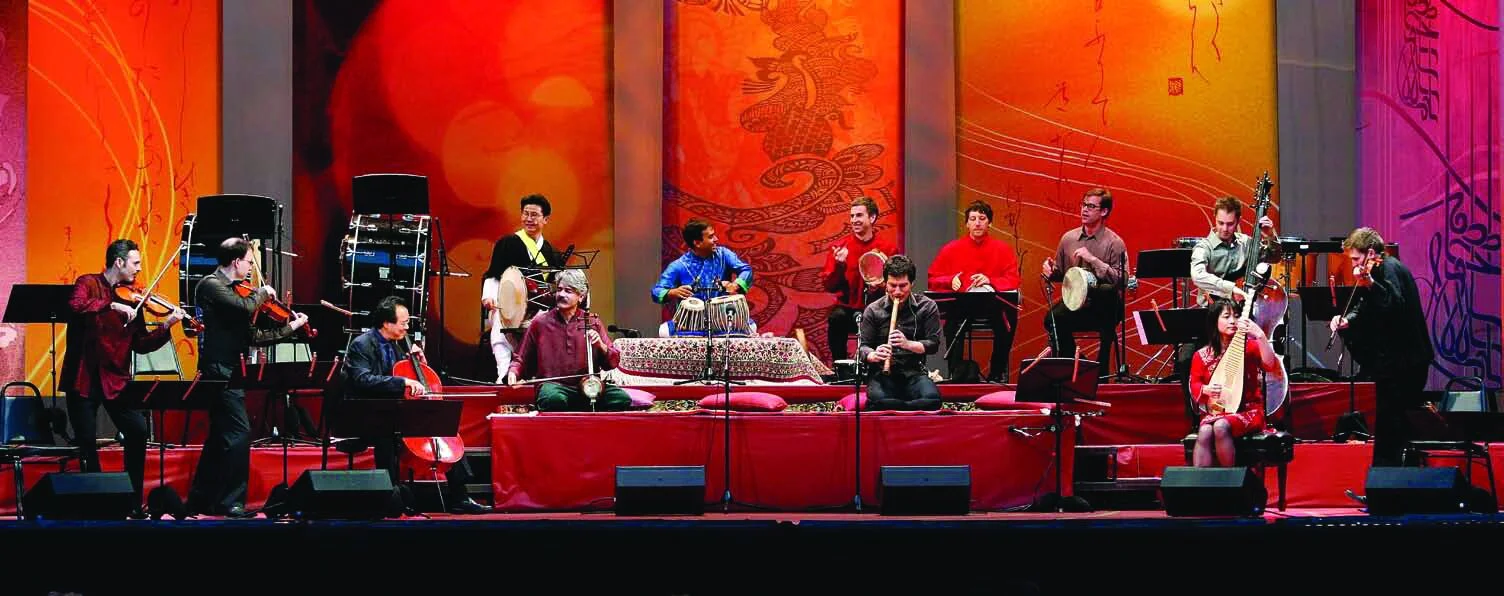Yo-Yo Ma's Silk Road Project
2002 Creativity Laureate
Yo-Yo Ma works in that zone between between disciplines, between cultures, where he and other artists from around the world (not only musicians, but also dancers and visual artists) make connections and collaborate to create distinctive new sounds and compositions. “Over several decades,” he says, “my travels have given me the opportunity to learn from a wealth of different voices – from the immense compassion and grace of Bach’s Cello Suites to the ancient Celtic fiddle traditions alive in Appalachia, to the soulful strains of the bandoneon of Argentina’s tango cafes. I have met and been guided by musicians who share my wonder at the creative potential that exists where cultures intersect.”
“Our creativity begins with play– exploring sounds, testing ideas,” Yo-Yo Ma points out. He still performs classical Western music with traditional orchestras. But most of his time is devoted to experimentation and teaching, making possible collaborations between musicians from different traditions, encouraging cultural innovation, and bringing teaching artists into classrooms.
At Yo-Yo Ma’s website and at the website of his Silk Road Project, you can watch videos of him practicing with musicians from every conceivable tradition, who are playing on instruments you might not have seen before. It’s great fun watching Yo-Yo playing with bluegrass musicians Stuart Duncan, Edgar Meyer, and Chris Thile, making music that defies categorization in their “Goat Rodeo Sessions.” It’s remarkable watching 450 sixth grade students in New York City sing along with the Silk Road Ensemble and Yo-Yo Ma, whose enthusiasm is contagious. And it’s inspiring listening to the range of compositions that have been created for the Silk Road Ensemble, by musicians and composers from the US, Iran, Mongolia, Japan, Korea, Syria, China, and Lebanon, for instruments ranging from the violin and cello to the pipa, Kamancheh, and duduk.
Over the past ten years, the Silk Road Project, spearheaded by Yo-Yo Ma, has epitomized the cross-cultural virtuosity and generosity of Yo-Yo himself. The Silk Road Project was inspired by the scope of the ancient trade network that connected Asia to the Mediterranean. “For centuries this primary route for the exchange of goods, arts and scientific discoveries also enabled the spread of religions, the growth of languages, and the migrations of people and their ideas,” the Silk Road Project website explains. “Historically, the Silk Road offers unparalleled insight into how ancient societies intersected.”
Silk Road Connect, a middle-school program that is part of the Silk Road Project, is seeking to connect artists and audiences in different global communities. "We've worked with public schools in four boroughs of Manhattan over the last two years, with the same idea of tying the arts to English, math, social studies. I think a lot of schools and communities are headed that way."
Yo-Yo Ma is attempting to bring about cultural exchanges and creative intersections in the 21st century. "My job as a performer is to make something memorable,” he says. “If I do something nice but forgettable, it needn't have happened. But if it sinks inside someone else's brain and then they make connections, that's something worth doing, because you're going to intimate places in someone else's psyche. I spend a lot of time thinking about what is the magical mix that can make the thing I love to do be so wonderful for others."
Cellist Yo-Yo Ma wants us to listen to music with an open mind. Essentially grounded in the classical tradition, his reputation was launched with recordings of the moving cello suites by Johann Sebastian Bach in 1983. But Ma has moved in many directions, some difficult to define. He has performed a wide range of music from Bach to Beethoven to Appalachian bluegrass to Jazz to Chinese folk music to Argentinian tangos. Today Yo-Yo Ma mixes modern with traditional, performing music from cultures and traditions around the globe. In 1998 he conceived of the Silk Road Project, a study of cultural traditions along the ancient trade routes that stretch from the Mediterranean Sea to the Pacific Ocean. The Project has commissioned more than sixty works which are performed by the Silk Road Ensemble, a diverse collection of thirty-one musicians from all over the world.



